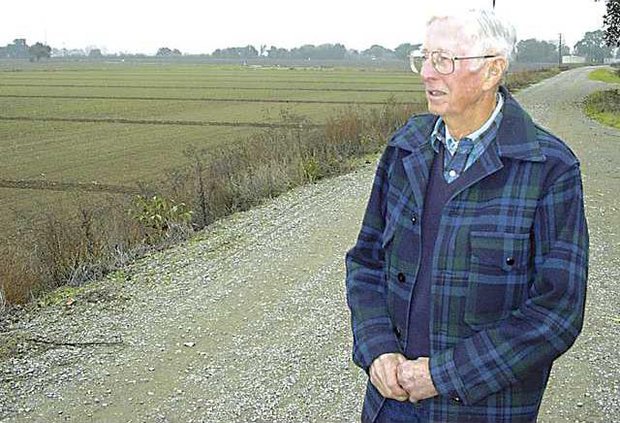The $11.1 billion water bond being pushed by the state legislature is expected to “trash the Delta,” according to Manteca farmer and recognized California water expert Alex Hildebrand.
Although the plan doesn’t delineate precisely how the money will be spent, Governor Arnold Schwarzenegger made it clear last week that it will include resurrecting the Peripheral Canal in some form to route Sacramento River water past the Delta and send it straight to Southern California.
“It’s physically impossible to accomplish what they say they are going to do,” Hildebrand said. “You can’t bypass the Delta and improve water quality in the Delta.”
Reducing water flows in the Delta would increase salt water intrusion and lower water quality for fish as well as agriculture in the eastern part of San Joaquin County. A San Joaquin County General Plan study in 2000 noted the biggest threat to agriculture – the county’s No. 1 employer – wasn’t urbanization but the building of a peripheral canal.
Water from the Cosumnes, Mokelumne, and San Joaquin rivers has already been basically diverted to the Bay Area. A part of the Sacramento River already heads south. The additional diversion to send the majority of the Sacramento River water to head south instead of flowing throw the Delta
Hildebrand said the basic problem with the water plan is that it doesn’t really do anything to address what is the most critical component – significant additional storage.
“There are 5 million people added in California every 10 years,” Hildebrand said. “Those people need food and water.”
Hildebrand cited a University of California at Riverside study that noted three quarters of an acre foot of water is needed to meet the annual food and water needs of a Californian.
That would mean every 10 years the state needs another 3.5 million acre feet of storage or the equivalent of 1.5 reservoirs the size of New Melones. That, however, isn’t exactly correct. Hildebrand noted that in reality the net yield from a million square feet of storage is about 20 percent or 200,000 acre feet due to other factors such as stream flows, evaporation, and the fact new storage can only be captured in wet years when excess water flows to the sea.
The storage capacity addition of the bond measure is minuscule in comparison to the need.
Hildebrand also noted that in order to reach the objectives the bond promises the state would basically have to ignore codes protecting agriculture as well as ignore water rights plus avoid adhering to agreements to address salinity in the South Delta.
Hildebrand said the governor’s office has repeatedly ignored suggestions that they don’t originate.
One such suggestion is the Delta Corridor Plan that Hildebrand said would cost a tenth the price a peripheral canal “and after all the paper work was done” would take about two years to construct.
It employs a bunch of low lift pumps and removable barriers to channel the San Joaquin River down what is essentially the Old River Channel to the Bay to improve water quality for fish and to reduce salinity.
Hildebrand agrees with the South San Joaquin Irrigation District Chairman Dave Kamper that an ominous part of the plan is the creation of a seven-member Delta Commission with four of the appointees given to the governor to make.
The panel would be able to issue decisions that would have the full impact of being law even though they would not answer to elected officials. Up until last month, the proposed make-up of the Delta Commission did not even include a representative of the Delta where 70 percent of the state’s water passes and will be impacted by almost any decision that is made.
Hildebrand believes time is rapidly running out for the state to avoid a long-term disaster that could permanently cripple California through water mismanagement.
“I’m an optimist by nature,” Hildebrand said, adding he seriously doubts the plan will work especially since it has about $2 billion worth of pork tossed into the bond measure.
To contact Dennis Wyatt, e-mail dwyatt@mantecabulletin.com





